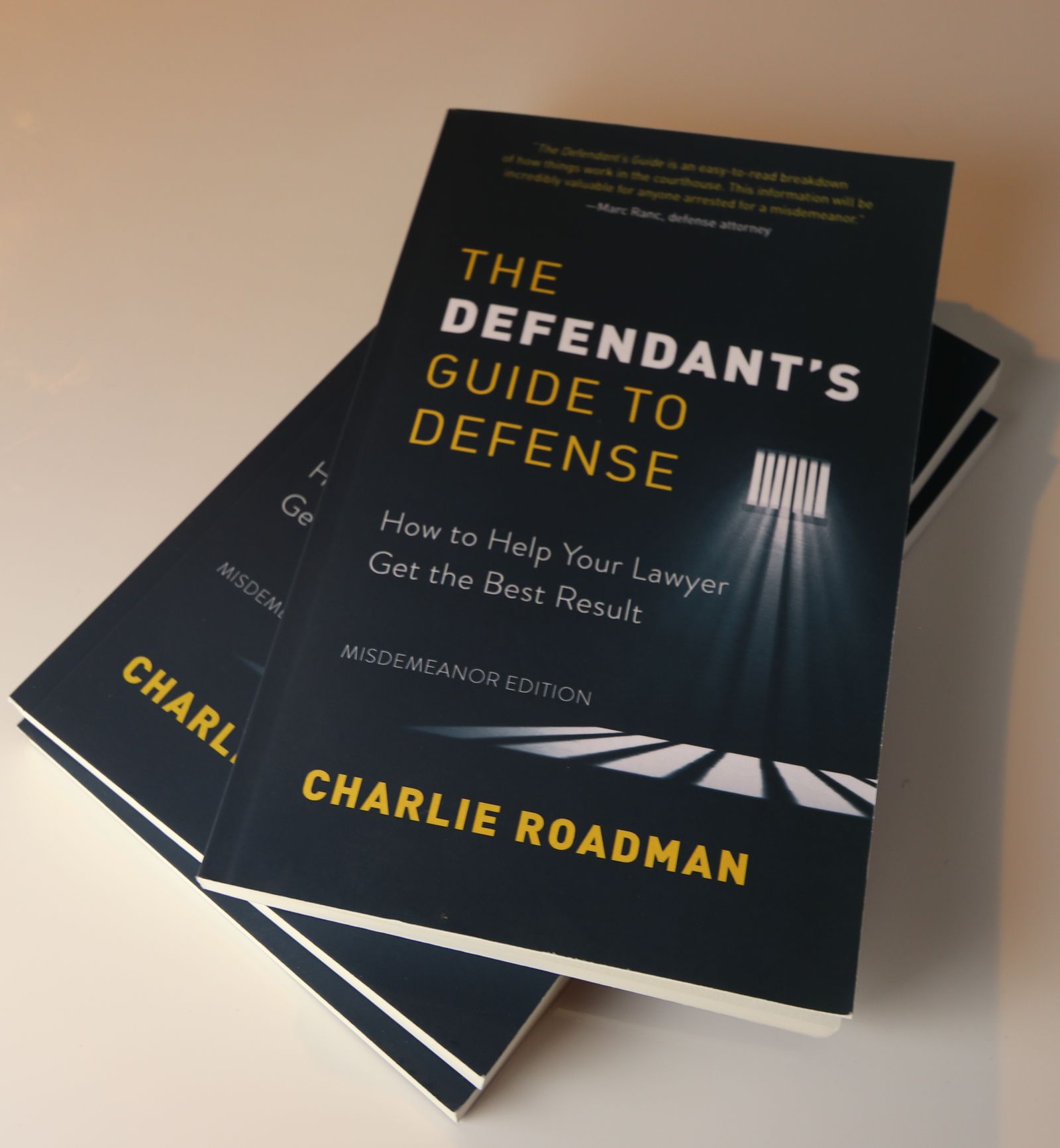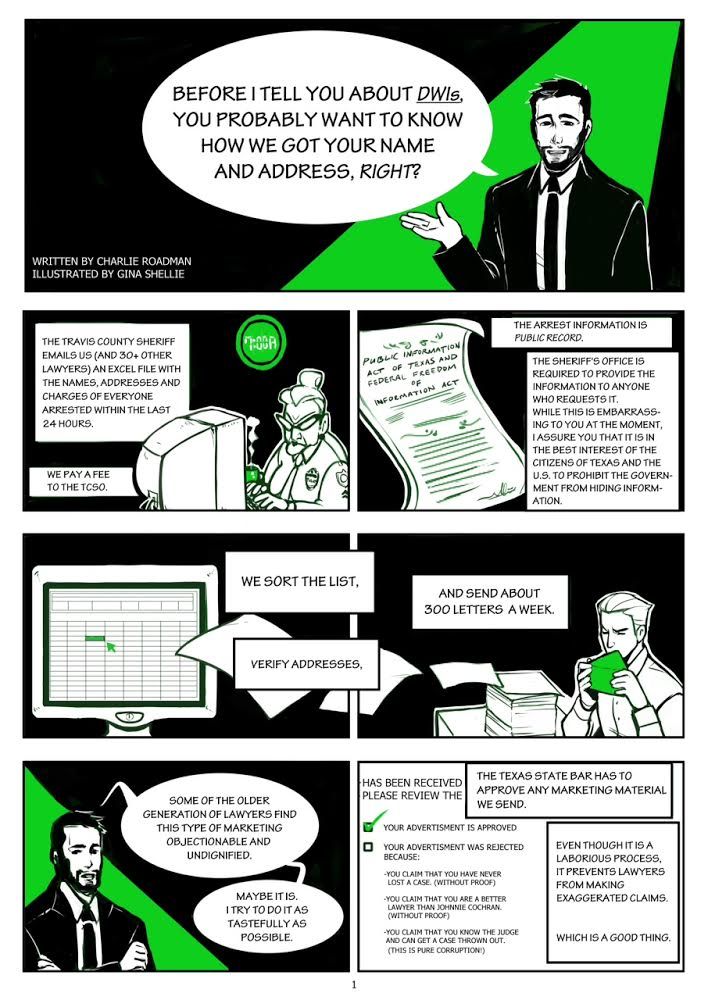Travis County DWI Pre-Trial Diversion Program podcast
Welcome to Austin DWI charges with Charlie Roadman, Austin criminal defense attorney. Practical advice on dealing with an arrest.
Ellen Stader:
Good afternoon, good morning, good evening, wherever you are. I am Ellen Stader. I'm here in Austin, Texas, with Charlie Roadman, a defense lawyer here in Austin. And this is Austin DWI charges. Is that right?
Charlie Roadman:
Yes. It's a very specific podcast for one type of problem.
Ellen Stader:
It is very specific and there is a lot to know. So let's jump in with this first topic today, Charlie. It is called the new DWI pretrial diversion program.
Charlie Roadman:
Yes.
Ellen Stader:
What is it?
Charlie Roadman:
Actually, most defense attorneys are really excited about this because it's a new option to get DWI cases dismissed under certain circumstances. And so, I've been doing this for almost 20 years now and the options to getting a DWI dismissed were always real small, you had to really have a low BAC and just anyway, it was difficult. And about four years ago, they started a pretrial diversion program, which allowed a dismissal if you completed the program. And then just recently they've loosened up the restrictions so that more people can get into it. And the basic qualifications are if it's a first DWI and that there's no collision with another person. Okay? And there can't be too much prior history. I mean, you have to apply and the prosecutors are going to generally go on a case by case basis.
Charlie Roadman:
And there's a lot of variables. You might intuitively think that there's 10 types of DWIs, but there's like 500 different types, of different things that could happen. Like, for example, what if you had one DWI dismissed 10 years ago? Well, will that count against you?
Ellen Stader:
Is this on your record? Is it part of, yeah. Okay.
Charlie Roadman:
But the main thing about the program is that if you complete it, it's a dismissal and they'll allow you to expunge the case.
Ellen Stader:
That's amazing.
Charlie Roadman:
Yeah. And what they're doing now is allowing, for that year long program, you need to have a alcohol monitoring device. But it can be the blow device in your car and the ignition interlock device, which while most people don't want that, that's a bargain. If you can get your case dismissed with having that for a year in your car, it's just like, take it and run. The program, for the last four years, has required the portable alcohol monitor, which is still an option if you choose to do this, it'd be rare that people would do this, but where you blow into it three times a day, every day for 365 days in a row.
Charlie Roadman:
Okay. Which is, a lot of times it's not hard for P people to not drink for the year, but it's really hard to coordinate blowing three times a day with busy lives and stuff. But now this new program, you don't need that. You can do the IID in your car, which of course you only have to blow into when you're driving somewhere, which isn't every day. And you're not going to forget to blow into it in your car because it's just in your car. Now, this is new and so, we're having this discussion in April, 2021. So, things could change, they could add conditions. I don't think they're going to subtract conditions, but they could say, well, a little more. And there is some community service that they're going to start requiring when the pandemic allows. And you do have to take classes.
Charlie Roadman:
But the main thing is it's not probation, although it can sort of feel a little bit like probation. I mean, but it's not, there's no probation officer and it's inexpungible. So when you complete it, and they're not even making you wait the whole statute of limitations, which would be a common thing, usually you have to wait two years after a dismissal, but they're allowing an expunction right away when you complete the program.
Ellen Stader:
Wow.
Charlie Roadman:
Yeah.
Ellen Stader:
Okay.
Charlie Roadman:
So it's kind of an amazing new option here and it's because there's been a change in the county attorneys. It's a new county attorney and she's a little more progressive. But for someone that's been doing this for so long, I almost would've said, there's no way they would create this program.
Ellen Stader:
Really?
Charlie Roadman:
Yeah. Just because the politics of it are... You're just...
Ellen Stader:
Well, it sounds like it's sort of a self-administered program and usually, let me just say, the state doesn't usually trust people to self-administer.
Charlie Roadman:
And that's exactly right. And if they blow, like, we call it blowing hot, into your IID, right, if you blow alcohol into your IID, the company automatically notifies the court and then you'll get kicked out of the program, and then you'll be in the regular general population of a DWI charge. But yeah, it's really the monitoring system is how it works. So, yeah. And surprisingly, you would think if you have an IID in your car, that the chances that you would blow hot into it are zero, right, because you know it's in your car. Like, they don't surprise you. Right? Right. But people blow hot in their IID all the time, because they drink the night before and they just assume, well, I've been to sleep-
Ellen Stader:
That it's all out of their system and-
Charlie Roadman:
And it's not. And so, then they get caught. So, I mean, there are going to be people kicked out of this program because they drink when they shouldn't. And the program, let me just make it clear, you're promising not to drink. So, if they catch you drinking, you're out.
Ellen Stader:
Right. That seems only fair.
Charlie Roadman:
Yeah. It does seem fair. But yeah, this is exciting. And we've had a few people get started and some of them, it's their first experience with criminal justice. And so, they're like, I have to have it in my car a whole year and they act like it's too much. I'm like, man, three weeks ago, you would've been on probation for two years.
Ellen Stader:
Right. They have no idea what they're escaping, and all that.
Charlie Roadman:
Yeah, exactly.
Ellen Stader:
So, for people who have not been in this position, maybe you can run down sort of the, what it might have looked like before and after.
Charlie Roadman:
Yeah. So before, if there was any type of collision, okay, and they included, if you scraped a sidewalk, if you just brushed up against the curb, they'd say that's a collision, you can't get into the program.
Ellen Stader:
Oh my God.
Charlie Roadman:
Yeah. And other things they would say, well, if your BAC was higher than a 0.15, you couldn't get in, even if you had blown under at earlier in the evening and then... Because the BAC sort of changes depending on what time they're taking the test as [crosstalk 00:07:58].
Ellen Stader:
And BAC is blood and alcohol content, by the way. BTW.
Charlie Roadman:
Right. Thanks. Yeah. Blood alcohol content. Right. So, and it was understandable. They had some sort of hard lines, and in some ways it didn't feel right, because some people... Well anyway, just anytime there's just hard lines, in life, you-
Ellen Stader:
It feels deliberately punitive, instead of just as a baseline.
Charlie Roadman:
Right. And so, in this new system, they're going to listen to us on case by case basis. And when we send in a application, what our office will do is, we'll gather a bunch of documents about our clients, showing them doing positive things or just try to humanize them. And so we attach that to applications and-
Ellen Stader:
The good guy file.
Charlie Roadman:
The good guy. The good guy packet, or good gal packet.
Ellen Stader:
Yeah.
Charlie Roadman:
And so, if we have someone that is over a line, over a limit, and actually, I'll mention that this one, they're not accepting DWI seconds and they're not accepting people with a blood alcohol content over 0.20, okay? Right.
Ellen Stader:
Okay. Reasonable. Sure.
Charlie Roadman:
Which is really high. So. But, and they're saying there can be some minor criminal history in the past, but says loose and how long in the past. Anyway, there's a whole bunch of-
Ellen Stader:
Variables-
Charlie Roadman:
Subjective. Yeah. That we try to convince them that we're on the side of let them in the program.
Charlie Roadman:
So yeah. In the past they wouldn't even look at people if you had a 0.151, and you're like, oh, but, but 10 minutes ago she blew a 0.149. Right?
Ellen Stader:
Right.
Charlie Roadman:
And you're just like, within 10 minutes, she went from a dismissal to two years probation on a DWI. And I mean, I am aware that DWIs are not good. And I mean, I guess I have to be careful about...
Ellen Stader:
Certainly. But I don't know. I want to call it erring on the side of compassion or maybe it's just leaving a little room for human judgment in the whole process.
Charlie Roadman:
And I think that's exactly what they're trying to do. Now, you can almost say, though, that if you go too far where it's all subjective, then the people that don't get in are mad.
Ellen Stader:
Yeah. Of course.
Charlie Roadman:
So, it really, actually, this business and this job, this career, it's a lot like that. Like if you take every single person's criminal case and look at it completely as an individual, nothing would get resolved because it would take 40 hours of exploring everything. So you have to make these for the groupings. Right? Okay.
Ellen Stader:
Certainly. Yeah.
Charlie Roadman:
This is a misdemeanor A, and misdemeanor B. And so you have to make a system that's somewhat efficient and somewhat consistent, even though in the county over, they're going to be tough than the county here. So. And Williamson County was, they're just getting a little bit less conservative, but they were like another planet, like over up there. And it's really interesting how our democracy works and when you get new people in and [crosstalk 00:11:54]
Ellen Stader:
And I think a lot of people don't know that the justice system can adjust, just based on the personalities that are populating it and sort of running the show.
Charlie Roadman:
Exactly. And that includes me who've been in the system for 20 years. I would've said, there's no way they're going to do this. I would've just said, not possible. It's not politically possible. Even when they were sort of running on as a campaign on this sort of progressiveness, I was just always sort of going, Yeah. They'll say that. And maybe they'll do some of that or try.
Ellen Stader:
But it's not going to make any noticeable difference in people's lives.
Charlie Roadman:
Or they're not going to when it finally comes down to it, they're going to pull back and go, you know what, I can't be too radical. Because this is almost radical. But the classes are good. So it's not like people don't have to do anything.
Ellen Stader:
Right. So that sort of leads me into the next question. I feel like we've talked about things, the requirements and sort of little bits and pieces, but can you lay out the chunk of when you get into this program?
Charlie Roadman:
So, they want you to do this, what's called a CES evaluation, which is where a Travis county counseling system evaluates you based on how your drinking habits, arrest and stuff like that. And they come up, they have a menu of classes and they say, you need to take this one or if you have a little higher level of use, take this one. So they've got this evaluation system and a pretrial diversion program will look at that. And they actually want people with not too much of a problem, right, because they don't sure they don't want people that are really, really struggling because they're not going to make it through the program.
Ellen Stader:
Right.
Charlie Roadman:
So, that's part of it. You get the CES evaluation, which stands for counseling education services. And then you start the classes, you can do them during the program, but you'll need to do those. And then there's a two hour, I guess, hour and a half mad victim impact panel class, now it's online. And it's a pretty good online class that takes about a hour and a half. And then you do have to pay for the ignition interlock device or the portal alcohol monitor, which are between 80 and a hundred bucks a month. So for the 12 months.
Ellen Stader:
So there's some expense involved.
Charlie Roadman:
Yeah. Some expense. But the program before this, there was a application fee that was like 400 and some dollars. And this one, they just said, no, we're not doing that. Why? No need to make it hard on people.
Ellen Stader:
That's amazing. So if you don't have a car and you can't have the device in your car, you can rent a portable one.
Charlie Roadman:
Yes. You can have a portable one. And I've run across this issue many times from doing this, where people, mostly is people with kids, right, they just don't want their kids to see them have to blow into this device.
Ellen Stader:
Understandable.
Charlie Roadman:
Totally understandable. So I've had a few people that have said, I'll do this portable device, even though it's 10 times harder. But it can be discreet. I mean, you have these windows to blow into it that are two hours wide, so like 7:00 AM to 9:00 AM. But you'll have to blow from four to 6:00 PM. But I say, if you can get away to use the restroom, you can have a purse. I mean, it'll fit in your purse. It's kind of big, but I mean-
Ellen Stader:
Carry a big purse.
Charlie Roadman:
Yeah. Carry a big... Or it's usually in your car. I've used it to see what it's like. And I just kept it in my car because my car was always near me. So. And I set alarms and stuff. But anyway. So yeah. So some people, the IID is too much or like real estate agents that drive people around. I've had them say, no way.
Ellen Stader:
That doesn't look good when you get in a realtor's car.
Charlie Roadman:
It doesn't. It doesn't. And so, there is that option. But yeah. But I would expect 98% of people get ignition interlock device in their car. And I say, you don't have to drive your car every day. Now, you can't drive another car, so you can't have two cars and put it in one and then just drive the one without it.
Ellen Stader:
Right. Yeah.
Charlie Roadman:
If they caught you doing that, they would be very, very mad.
Ellen Stader:
Well, and that indicates bigger problems. If you're trying to game the system that's trying to help you out, then yeah. You've got other problems.
Charlie Roadman:
Right. So although, I'm not sure I've ever heard anyone mention it trying to help them out. Even though it is. I think that's right. But yeah. It's be [inaudible 00:16:53]
Ellen Stader:
Within the scope their options.
Charlie Roadman:
Oh, I see what you're saying. Getting their dismissal.
Ellen Stader:
Yeah, right.
Charlie Roadman:
A system trying to help them get a dismissal. That's right. But yeah, the ignition interlock device, I was going to say something... Oh. People are worried that people on the outside will see it. Right? They think that, I'm going to go to the grocery store and then when I get out in the parking lot, 10 people are going to point at me and go. And they just can't see it. Well, A, no one's looking at you. Just, no one is looking at you. And then B, you can sort of bend down a tiny bit and blow. And anyway, I've put it in my car twice. And I've kind of flagrantly blown into it, with my head up, just like looking around with people around.
Ellen Stader:
Just to see who could see.
Charlie Roadman:
And I mean are people 10 feet away. They're not looking at me, they're doing their own thing. And so.
Ellen Stader:
People, yeah. People don't notice you. But I understand that feeling because when you've had a DWI, you feel like everybody's looking at you.
Charlie Roadman:
Right. Right. So. But people in your car will see it. You can't hide it from someone in the car. And then the other part about this that maybe people don't know is that you have to blow into it when you start your car, but also during your trip, while you're driving. You do. Which is weird. It'll start beeping randomly. And then while you're driving, you have to blow into it.
Ellen Stader:
So you can't get in your car, blow clean, and then crack a beer.
Charlie Roadman:
That's what they're trying to prevent, because you could just leave your car running out in the bar parking lot. Right? If you did that. But which unfortunately must have happened for them to come up with this.
Ellen Stader:
I'm sure everything you can think of has happened at one point.
Charlie Roadman:
So. But yeah. You have to blow into it. Which is mildly annoying. But even then you just sort of don't even think about it. And it does give you like five minutes. So theoretically you could pull over, because people do go, well, what if I get in an accident?
Ellen Stader:
Right.
Charlie Roadman:
I mean, I don't think you're going to get in an accident, but it gives you time to pull over and blow it. But I've never done that. Never saw... But...
Ellen Stader:
So you have the evaluation, you have the classes and you have the blood alcohol content device.
Charlie Roadman:
Yes. The ignition interlock device or the alcohol monitor. And so, to get in the program, they want you to apply within six months of the arrest. So we do it pretty quickly. Yeah. So there's an application. So, when we get a new client, we sort of evaluate. I mean, is this a first DWI? And was there an accident with another person, which would disqualify them from... So, then we have the clients fill out the application, we send to the prosecutors and they'll sort of do a preliminary thumbs up or thumb down. And then they'll sort of evaluate the facts and just make sure there's nothing in there that they don't like.
Charlie Roadman:
And then sometimes if people get rejected, we sort of look at it and go, is there any way we can spin this or go to this prosecute... So we do what defense attorneys do, which is try find the cracks in the system and get there. But, yeah. It's a great program. And in the last few weeks I've been able to tell people, all you have to do is this, and your case is going to be dismissed, and they're super happy.
Ellen Stader:
I'll bet. Absolutely. Yeah. Wow. It's like giving people a shortcut to freedom.
Charlie Roadman:
Yeah. And then the other part that I just think is important is that the arrest is traumatic. Right? I mean, it's awful. No matter what type of scenario, whether there's been an accident obviously, that's really bad. But even if you're just pulled over for speeding or something, going to jail is terrible. Okay? And so, I do think that like, people aren't going to do this program, get their case dismissed and expunged and then get out and say, well, that was easy. I mean, they're going to...
Ellen Stader:
I'll just do that again next time.
Charlie Roadman:
Yeah. Yeah. I mean, now people have alcohol problems in that they do foolish stuff, but it isn't because they're going to think that this program was a breeze. It doesn't go back in time and take away the 24 hours you spent in jail. Anyway.
Ellen Stader:
Right. Definitely not. And also a year of consistent effort, that's got to change your behavior as well.
Charlie Roadman:
Yep. And the classes and... So, I'm excited. I think most local defense attorneys are excited to be able to deliver some good news for once.
Ellen Stader:
That's exactly what I was just going to say. Yeah.
Charlie Roadman:
So often we're like, ugh.
Ellen Stader:
Sorry buddy, I got nothing for you. But yeah.
Charlie Roadman:
So.
Ellen Stader:
That's fantastic.
Charlie Roadman:
But I think that's the main stuff.
Ellen Stader:
Okay. That's the story on what? Tell me again what it's called.
Charlie Roadman:
The Travis County DWI pretrial diversion program.
Ellen Stader:
Ah.
Charlie Roadman:
Now, and there's different pretrial diversions for general cases, but this is one specifically for DWI.
Ellen Stader:
For DWI.
Charlie Roadman:
Yeah.
Ellen Stader:
Right on. You heard it from the lawyer's mouth, the Travis County DWI pretrial diversion program.



